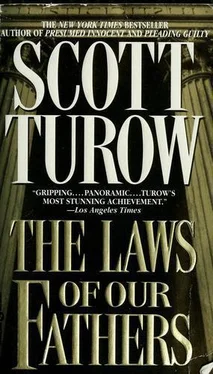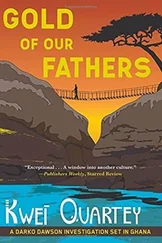Scott Turow - The Laws of our Fathers
Здесь есть возможность читать онлайн «Scott Turow - The Laws of our Fathers» весь текст электронной книги совершенно бесплатно (целиком полную версию без сокращений). В некоторых случаях можно слушать аудио, скачать через торрент в формате fb2 и присутствует краткое содержание. Жанр: Криминальный детектив, на английском языке. Описание произведения, (предисловие) а так же отзывы посетителей доступны на портале библиотеки ЛибКат.
- Название:The Laws of our Fathers
- Автор:
- Жанр:
- Год:неизвестен
- ISBN:нет данных
- Рейтинг книги:5 / 5. Голосов: 1
-
Избранное:Добавить в избранное
- Отзывы:
-
Ваша оценка:
- 100
- 1
- 2
- 3
- 4
- 5
The Laws of our Fathers: краткое содержание, описание и аннотация
Предлагаем к чтению аннотацию, описание, краткое содержание или предисловие (зависит от того, что написал сам автор книги «The Laws of our Fathers»). Если вы не нашли необходимую информацию о книге — напишите в комментариях, мы постараемся отыскать её.
The Laws of our Fathers — читать онлайн бесплатно полную книгу (весь текст) целиком
Ниже представлен текст книги, разбитый по страницам. Система сохранения места последней прочитанной страницы, позволяет с удобством читать онлайн бесплатно книгу «The Laws of our Fathers», без необходимости каждый раз заново искать на чём Вы остановились. Поставьте закладку, и сможете в любой момент перейти на страницу, на которой закончили чтение.
Интервал:
Закладка:
'And I wrestled with myself. I struggled. Viewing that squalor, I would look at those babies, those precious babies, and wonder, "How do I say to you, after all this work, after this great triumph, how can I say to you that it will be no better in your lifetime? How do I, where do I, derive the right to tell you to wait?"
'You see, I couldn't really comfort myself with hopes for future generations, because that meant accepting her misery, the misery of the child I saw now. And I couldn't agree to the sop of the religious, heaven,' he said with mild contempt, 'the poor received in glory, because after all, after all, it was not just the Kingdom of Heaven that Jesus said the meek would have – he said they would inherit this earth. Was he merely taunting them? So that was the question, you see: How do I temporize with this generation? With any one child? What mandate of law, of God – where in anyone's teachings, Christ's or Marx's or Adam Smith's, where does it explain how a government derives the moral authority to tell the poor to languish in squalor, to wait and wait for the earth that is theirs while it is consumed by the rich? What happened to me, Seth, was that my faith, or my conscience, or my moral sensibility, told me there is no logic to this life but revolution.' His dramatic eyes were wide and pale as a wolf's. I was never of anything but two minds about Eddgar. I always recognized how theatrical he was. But as he finished his tale of ardor and personal pain, as he headed off alone beneath the arches of the esplanade, I was barely breathing.
Near 3:30 each day, chubby little Nile Eddgar limped home from first grade and became my responsibility. June had chopped Nile's straight brown hair into a bowl-shaped do a la the Little Rascals, but it would have been a stretch to call him 'cute.' He was an unsmiling, slow-moving soul, a turbulence of shirttails, smudged cheeks, and dirty fingernails. After devouring a snack his mother had left, Nile languished, child of the revolution, in front of my television. His parents prohibited TV and had gone so far as to get rid of their set, but somehow I found myself powerless to keep Nile from the dials. He would sit entranced, stroking one of the few toys he was allowed, Babu, a handsome bear with a pelt of shiny synthetic fur. I seldom interested Nile in the list of kid-time activities June had suggested – the park, the library, projects from school. He seemed to have no friends, partly because Eddgar, wary of government snoopers, didn't allow visits with families he hadn't approved. Instead, Nile moped around, telling me often how much better he liked Michael Frain, the physics graduate student who lived next door to Sonny and me and who had been Nile's sitter for the last two years. Frequently Nile would sneak away and hide in Michael's apartment, waiting for him to come home, at which point Nile would follow Michael around, resisting my efforts to recapture him.
I found Nile's relationship with Michael humiliating. I knew I was a pretty lousy baby-sitter. I was quick to regard myself as wounded by my childhood, yet I had little memory for a kid's preoccupations, while Michael, who was mute, virtually flash-frozen, with adults, could fall with Nile into the rhythms of children's play. I'd find them in a treehouse in the back yard, or in the park, making funny noises and ugly faces at each other as they twisted around a jungle gym, engaged in games where the rules changed moment by moment. 'Let's say I'm the guy who wants the treasure, no, you're the bad guy, okay then we're both the good guys, and these other guys… No, wait.'
Michael had come from a small town in Idaho, and he had about him the arid, silent mystery of those high, empty plains. Michael spoke slowly and only after considerable reflection in a voice with a heehaw monotone that climbed uphill at the end of every sentence. He had a bit of a stammer, too, so that you had to wonder if perhaps he'd been taunted into silence at home or in school. His looks, I was told, were a little like mine – tall and thin with a prominent nose – but he had a fragility I never saw in myself. His head appeared delicate as a china bowl, his skin drawn tightly across his skull, with the wiggly purplish trace of a prominent vein near his temple. Grown long in blondish dreadlocks, his hair was already receding.
I initially viewed Michael as a hapless turkey, with his slipstick hanging from a plastic holster on his belt. But he eventually sifted his way into our life. I found him uncommonly generous. Michael filled in with Nile when he could, and also helped me keep up a preposterous fiction I'd created for my mother that Sonny and I were living in different apartments. The idea of me cohabiting with a woman was much too much for my mother. In her Old World view, marriage would have been morally required, an impossible thought both because Sonny was not Jewish and because it would represent one more rending of the strong fabric that bound me to her. Instead, I'd had a second phone installed in our apartment which I alone answered when my parents called. With Michael's permission, I gave my mother his address and thumbed through his mail each day for her letters.
Nonetheless, what drew Sonny and me to Michael most strongly was probably our stomachs. He could cook, a skill we each decidedly lacked. With the wok, Michael was a master. He could tell the temperature of hot oil within a few degrees, by dropping a scallion on the surface and watching it wither. Since it was often my job to give Nile dinner, and Nile always craved Michael's company, the four of us often ate together. I shopped. Michael was the chef. Sonny did the dishes. We pooled our student food stamps for costs and also fished scraps out of the Eddgars' refrigerator. On the weekends, we were frequently joined by Hobie and Lucy. She was a terrific cook herself and would add exotic touches – cilantro and peppers she'd found in the mercados along Mission Street, or watercress which she'd discovered growing wild beside the golf course in Golden Gate Park.
Michael also began to join us for something we called 'Doobie Hour.' In college, Hobie and I had always ended the day together, passing a joint with dormmates, and we'd more or less kept the custom alive in Damon. In our living room, amid the tattered, used furnishings, we'd all watch an 11:30 p.m. rebroadcast of Walter Cronkite that followed the local news. We smoked or drank wine, making smug remarks in reply to Nixon or Agnew or Melvin Laird when they appeared on the TV screen. Michael would pass on the j, but always seemed to enjoy Hobie's and my late-hour riffs.
Usually during those first months in California, when the news was over, I became the entertainment, reciting weird little sci-fi fantasies that ventilated my grim obsessions and which I liked to pretend could be turned into movies. There was one about a fakir who somehow lost his ability to walk across hot coals; another about a heartless mercenary from Vietnam who became the ruler of a South Seas nation and met a chilling end when the natives saw through his magic. One night Michael told us how the universe was expanding but might someday reach its limit, contracting like a rubber band. According to Einsteinian theory, this would cause time to run in reverse. I spent a number of nights thereafter spinning out tales about this inverted universe in which effect preceded cause, where people at birth sprang out of their graves like tulips and grew ever younger, where you knew the lessons of life before you'd had the experience, and where you perished while your parents were at the height of passion. Michael was especially amused by my freewheeling improvisations on the principles of physics.
He spent most of his time at the Miller Damon Applied Research Center – the ARC – which was located in the elephant-toed hills south of the campus. Within its walls, elite scientists conducted experiments in high-energy physics, including many projects sponsored by the Defense Department in hopes of aiding in the war. According to various reports, these included efforts to miniaturize nuclear devices, to perfect laser-guidance systems for mortar shells and bombs and – the innovation that was bruited about most often on campus – the battlefield use of microwaves.
Читать дальшеИнтервал:
Закладка:
Похожие книги на «The Laws of our Fathers»
Представляем Вашему вниманию похожие книги на «The Laws of our Fathers» списком для выбора. Мы отобрали схожую по названию и смыслу литературу в надежде предоставить читателям больше вариантов отыскать новые, интересные, ещё непрочитанные произведения.
Обсуждение, отзывы о книге «The Laws of our Fathers» и просто собственные мнения читателей. Оставьте ваши комментарии, напишите, что Вы думаете о произведении, его смысле или главных героях. Укажите что конкретно понравилось, а что нет, и почему Вы так считаете.












